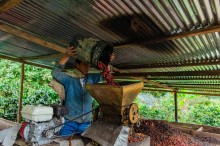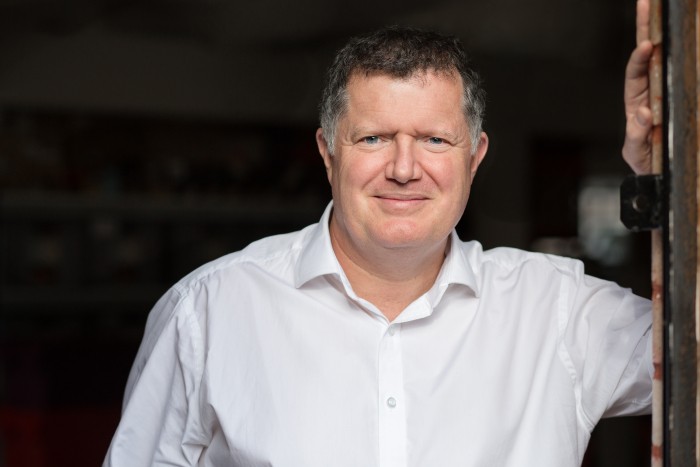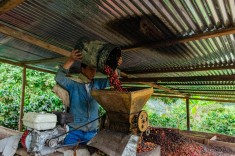Cafédirect CEO: How Fairtrade creates a better life for farmers and a better cup of coffee for you
 12 May 2023
12 May 2023 From bananas and flowers, coffee and wine, to textile and composites, you see the Fairtrade label on a wide range of products today. Buying Fairtrade directly improves farmer’s lives around the world even as volatile prices and climate change threatens their livelihoods, John Steel, CEO of the alternative trading coffee company Cafédirect, told us ahead of World Fairtrade Day this week.
When you buy products with a Fairtrade label, you support farmers’ ability to make better choices about their lives and to invest in their future.
Small-scale farmers and workers are among the most marginalised by the global trade system, and are often unable to secure a living wage for their produce.
Fairtrade International, established in 1997, attempts to solve the problem by applying independently agreed economic, environmental and social criteria to help ensure that farmers and agricultural workers can sustain themselves through their work.
The organisation works with more than 1.8 million farmers worldwide, across more than 300 commodities, including coffee, cocoa, tea, fruit, flowers and sugar.
Fairer terms and better prices for farmers worldwide
“Fairtrade is about better prices, decent working conditions, local sustainability, and fair terms of trade for farmers and workers around the world, but particularly in lower income countries,” explains.
“Fairtrade pricing is set to make sure that that farmers will always cover the basic cost of production plus some additional funds, and this acts as an essential safety next when the market price crashes,” he said in a recent interview with Oikocredit. “In this way, Fairtrade begins to address the injustices of conventional trade, where farmers receive and carry most of the risk of the market’s price volatility. This starts to create a pathway to decent livelihoods and more control over their lives.”
Cafédirect was founded in 1991 in response to the collapse in coffee prices falling below farmers’ production costs. The organisation cuts out the middleman through direct partnerships with coffee bean, cocoa and tea growers, giving them a larger slice of the purchase price for their products.
Oikocredit’s Equity team rates Cafédirect ‘excellent’ according to our environment, social and governance (ESG) criteria.
Improving livelihoods and addressing price volatility
Fairtrade has a major role to play in improving rural livelihoods, John explains.
“We know that 80% of people living in extreme poverty are dependent on agriculture for income. So, it’s fundamentally critical that the price farmers receive for their crops is considered and protected,” he says.
Although they receive a better price for the output, Fairtrade farmers continue to suffer from extremely volatile and unpredictable prices.
In 2022, coffee prices hit a 10-year high, rising 78% within a year to just over $2.39 per pound. But towards the end of 2022, the coffee market crashed by about 40%, dropping to $1.61 per pound.
This makes it impossible for farmers to plan or invest in their businesses, let alone invest in sustainable farming, John explains.

Tackling unexpected and recurring challenges
Fairtrade certification works at a deeper level too, supporting farmers during uncertain times, protecting against climate change, and promoting gender equality.
As an indication of the security Fairtrade provides members, an October report revealed how Fairtrade-certified organisations were 12% less likely to report a high or very high impact from Covid-19 as compared to non-Fairtrade households.
“The farmers we work with at Cafédirect tell us that climate change is their number one concern – and so adaptation is extremely important for their survival,” John says.
“As climate change deepens, its effects will worsen.”
It's predicted that by 2050, rising temperatures will reduce the area suitable for growing coffee by up to 50%, increasing the price for the consumer. Supply restrictions and further price volatility may well become more common.
Using microfinance to make a difference
Finance – and microfinance in particular – has a key role to play in addressing economic challenges across the sector.
“Fairtrade-buying members found they were unable to provide pre-finance to cooperatives because of the additional financial burden and risk. It’s clear that it needs to be easier for cooperatives to access pre-finance, and without sanctions,” he says.
“Finance is vitally important for farmers to change their situation – there needs to be more willingness to lend.”
Improving your morning cup of coffee
Cafédirect tackles these issues head-on in several ways beyond paying Fairtrade prices.
Through its farmer-led NGO partner, Producers Direct, Cafédirect reinvests its profits in measures such as new training, technology solutions, loans and finance, and by supporting quality control and more efficient energy sources.
Cafédirect also recently launched a new range of roast and ground coffee that highlights how Producers Direct impacts gender equality, youth leadership and climate action projects.
As he puts it, their model of Fairtrade and investing in farmers through Producers Direct creates “a better life for the farmer and a better cup of coffee for the consumer.”
Archive > 2023 > May
- 31 May 2023 - Q1 2023 quarterly report: A positive start to the year
- 25 May 2023 - Oikocredit Live: Combatting Climate Change.
- 23 May 2023 - Adama Bah: When women lead, business performance improves
- 22 May 2023 - Oikocredit updates NAV calculation
- 12 May 2023 - Cafédirect CEO: How Fairtrade creates a better life for farmers and a better cup of coffee for you
- 09 May 2023 - Oikocredit invites members to AGM on June 9 in Amersfoort
- 04 May 2023 - Award-winning Fonkoze brings healthcare and hope to low-income Haitian communities

